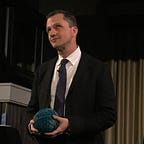Overcoming Exhaustion Fatigue
It only took four minutes and thirty-three seconds to re-connect with my life.
The thought of another video call made me want to weep (apparently I wasn’t alone).
I had lost my ability to concentrate on words (apparently I wasn’t alone in this either).
Television? I realized I had done so much binge-watching, I wanted to purge.
After so many weeks of feeling exhausted, was starting to get exhaustion fatigue.
“For we should be hushed and silent”
At this moment, I tried reading again, and stumbled upon this blog post by Karissa Krenz, the Senior Editor for WQXR.org (New York City’s classical music station.)
It is, simply, perfect.
Krenz reminds us of a curious piece of music by 20th Century composer John Cage, called 4’33’’ (Four minutes and thirty-three seconds) written in 1952.
The work is silent.
Any number of instrumentalists walk on stage, sit at their places for 4 minutes and 33 seconds, and then get up and leave.
As a teenager studying classical music, I thought he had written it as a hilarious joke. As a college student studying music in my 20s, I thought he had written it as an ironic nose-thumbing to the dissonance of modern music.
Now I understand what Cage was actually doing.
He was forcing us to stop for 4’33’ and just be.
In her blog post, Krenz goes on to quote a speech that Cage gave in 1927 that includes these remarkably prescient words:
“One of the greatest blessings that the United States could receive in the near future would be to have her industries halted, her business discontinued, her people speechless, a great pause in her world of affairs created, and finally to have everything stopped that runs, until everyone should hear the last wheel go around and the last echo fade away …For we should be hushed and silent, and we should have the opportunity to learn what other people think.”
Backyard Concerto
It was before dawn this morning when I read these words.
A brisk morning in Portland, I took my coffee, bundled up and walked into the darkness of my backyard to experience a new performance of 4’33’.
It began with the steady hum of Interstate 84, the major East-West highway in Oregon, which is 5 blocks away.
This reminded me of another great work of proto-minimalism, Charles Ives’ The Unanswered Question. This work begins with a glacial series of repeated pianissimo string pads, setting the stage for what is to come.
Soon, the I-84 hum was joined by the first bird of the morning, repeating an 8-note motif in consistent intervals. For a short while, this was the piece, and it was enough.
Then, another bird, occupying a different octave and a wholly original time signature began its own song in counterpoint to the first.
In quick succession, a third joined in, this one startlingly six feet from my head, cutting through the other songs not just in volume but in clarity.
This seemed to be the cue for the rest of the bird chorus to awake, and soon their notes spiraled and swooped and combined: the highest chitters of the hummingbirds, the antagonistic barks of the crows, the crystalline peeps and chirps of myriad species I couldn’t identify.
It wasn’t symphonic, though.
Each voice was distinct. It was more like chamber music, where each artist is at once soloist and ensemble-member.
I was reminded of the opening notes of Copland’s Appalachian Spring, originally written as a chamber work for 13 instrumentalists.
Now, it would be horribly cliche to suggest that at this very moment a gentle rain started.
But it’s true.
The drops hitting the flowers and leaves of our blooming dogwood provided the steady beat required to complete the piece.
Bolero’s snare drum.
The sky grew lighter, the highway hummed a little louder, the rain kept a constant rhythm, and the full-throated birdsong gave me all the assurance I needed: things would be ok.
Life goes on, even in the silence. Especially in the silence.
And my fatigue melted away.
